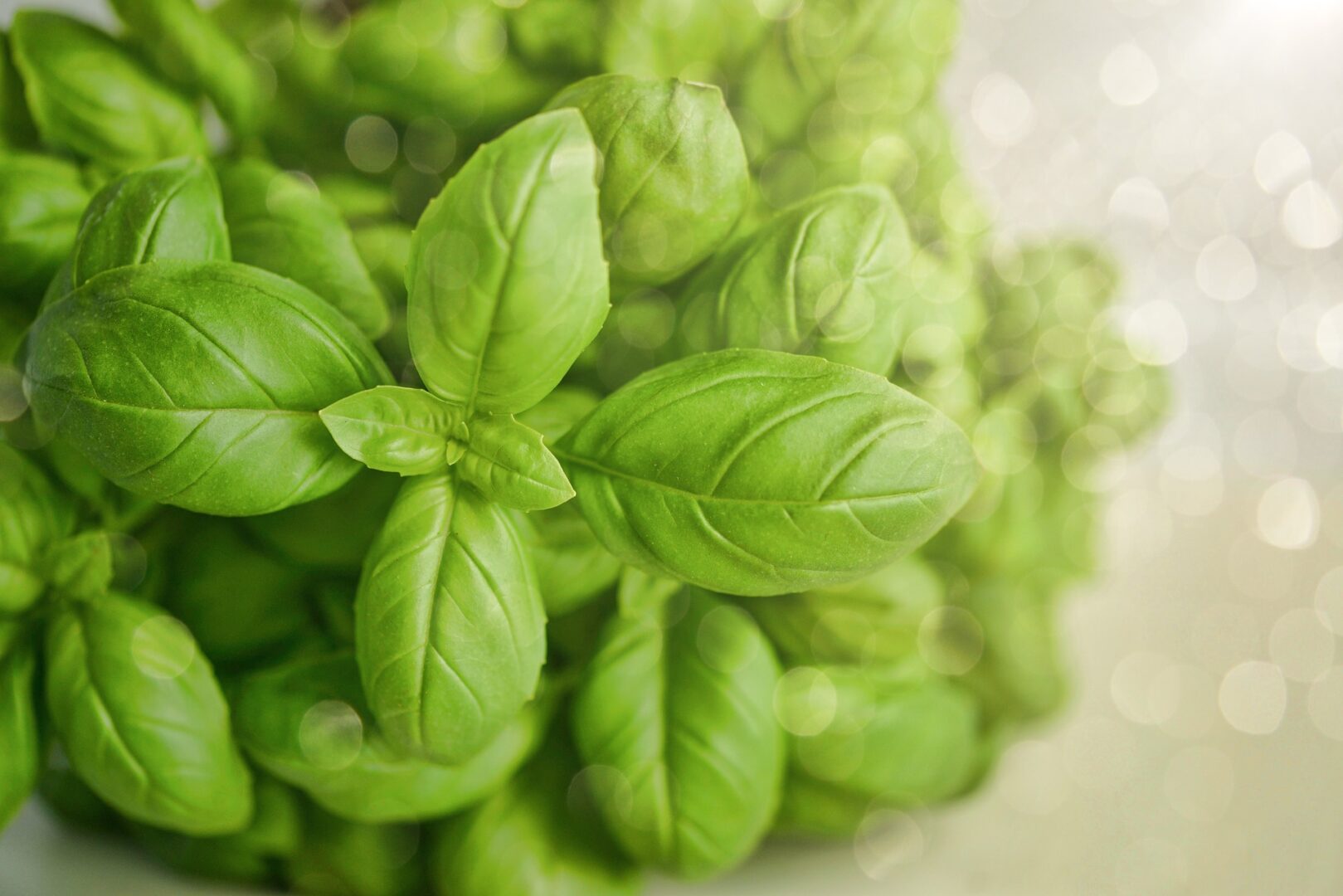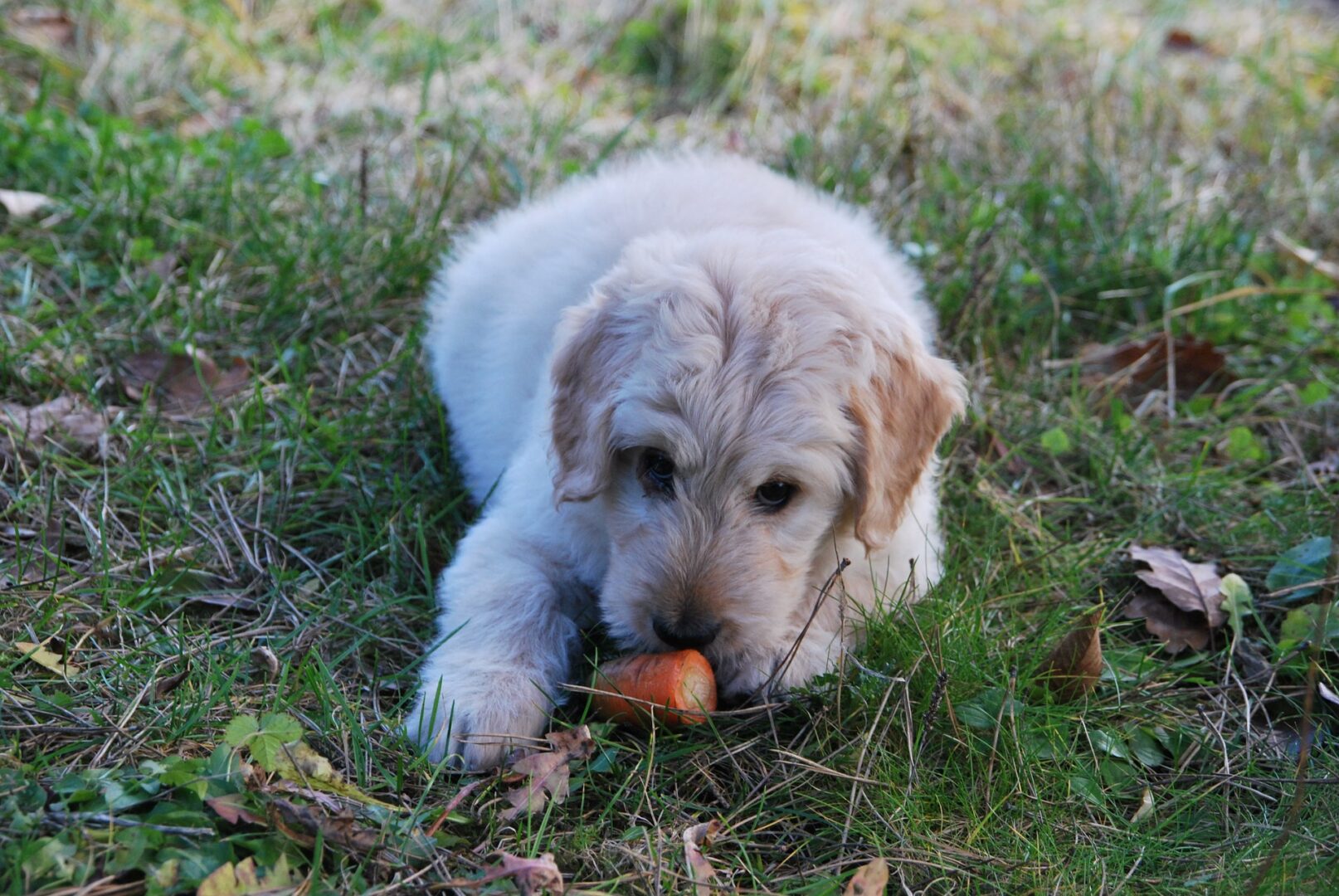All dog parents wonder about the types of food that are safe for their dogs, and if you google, “can dogs eat […]?”, you’re bound to find almost every type of food known to man as the completion of that question! You’ll also find a large number of dog parents asking, “is basil poisonous for dogs?”
Well, don’t worry, we’re here with the answer. In this article, we’ll tell you if you should feed your dog basil so you’ll no longer feel guilty for sharing food with your canine buddy.
Can Dogs Eat Raw Basil?
Let’s start at the very beginning. Can dogs eat raw basil? The answer is yes!
Not only is basil one of the favorite herbs globally when it comes to human foods, but it’s actually safe for dog owners to serve basil to their canine friends. Basil leaves can even boost the dogs’ health and provide them with many health benefits as it contains manganese, iron, and calcium, as well as vitamins A, K, B, and C.
But keep in mind you have to include it in your dog’s diet in moderation so as not to cause an allergic reaction.
How Much Basil Can a Dog Eat?
Quantities are paramount when it comes to your dog’s food, as too much basil can cause toxicity, among other health problems.
So use basil as a dog treat or add it to regular dog snacks in small quantities. A teaspoon or two per meal will be more than enough to provide your dog with all of the benefits that basil can offer.
Basil’s Numerous Health Benefits
Basil falls under the category of “herbs and spices,” as it can be consumed in both manners; fresh basil is a herb, while dried basil and roasted basil are spices. And there are actually varieties of both types, as we have sweet basil and Thai basil.

Luckily, both varieties are safe to use in dog food either as an herb or a spice. And no matter the variety or type, basil has some great health benefits for dogs. Here are some of them:
Anti Inflammatory Properties
Basil’s anti-inflammatory properties are awe-inspiring, to say the least. It has an antioxidant effect, so consuming it destroys free radicals, thus preventing them from damaging the body cells.
This leads us to even more health benefits such as anti-aging properties, as basil protects the bones in the joints from inflammation, as well as cancer-fighting benefits because free radicals are some of the strongest contributors to the development of such disease.
Lastly, eating basil results in cellular stability, as dogs who eat basil have a much higher level of cell protection thanks to this non-toxic herb.
Antifungal Properties
Basil has been known to reduce the mycelial growth of fungus, meaning it has antifungal properties; it kills fungus then starts to inhibit the toxins produced by it to cut the damage as much as possible.
Vitamins
Another highly impressive property of basil is its incredibly high content of vitamins A, K, C, and B complex.
Vitamin A is, of course, vital for the maintenance and strength of eyesight. As for vitamin K, it’s one of the main components of the coagulation chain, thus helping to maintain blood flow and prevent clotting.
On the other hand, Vitamin C is anti-inflammatory and has a huge impact on the immune system. Consequently, a boost of vitamin C means a boost of immunity. And vitamin B complex is crucial to the health of the nervous system and for the communication between the brain, the spinal cord, and the rest of the body.
Minerals
Basil comes with a high content of minerals in general; mainly, iron, calcium, manganese, magnesium, and cobalamin.
All these vitamins are pillars of maintaining a healthy body, from building teeth, bones, and hair to regulating heartbeat, transmitting energy, maintaining blood flow and circulation, and boosting digestive health.
So, adding basil to your dog’s diet will definitely boost their general health and improve the state of their body.
Healthy Digestive Tract
Just like other herbs, basil is full of fiber. And fiber is extremely important for the gastrointestinal tract, as it improves its motility, thus maintaining a healthy bowel movement. So it’s highly recommended that dogs eat basil in moderation.
Anti Anxiety Effects
Basil has been known to have an anti-anxiety effect on both humans and dogs. Just like it offers calming properties when added to human food, the same effect can be obtained when dogs eat basil leaves.
So serve basil to your dog before taking them to the vet, giving them medication, or having them meet strangers. An added bonus is that it’ll calm them down without resorting to any prescription medicines.
Related Content:
Can Dogs Eat Apple Cores?
Can Dogs Eat Cilantro?
Can Dogs Eat Granola?
Possible Dangers of Adding Basil to Your Dog’s Diet
We’ve now established that fresh basil or dried basil can both be strong contributors to your healthy dog food palette. However, we’d also like to remind you that although dogs can eat basil, going overboard will be counterproductive.

Whether you choose Thai basil or sweet basil, putting too much basil in dog food can cause a lot of problems for them in their digestive system, skin, and brain.
Gastrointestinal Tract Disturbance
We’ve mentioned before that when dogs eat basil, they’re getting a lot of fiber, and this fiber will help stimulate their digestive system, which is amazing as long as it’s done in moderation.
But when dogs overeat basil, getting so much fiber can lead to either blockage of their digestive system, thus a serious case of constipation, or cause too much motility, thus resulting in diarrhea, which can be fatal if left untreated.
The consumption of too much basil can also cause inflammatory bowel disease. So, be careful not to go overboard.
Allergy
Just like people have different reactions to human foods, we also can’t predict for sure how dogs react when they consume basil. So an allergic reaction can always be in the cards, and you should always look for any signs of allergies when introducing new food to your canine friend.
Also, keep in mind that an allergic reaction can present itself in more than one way. For example, it can present as swelling, eczema, rashes, edema, hyperventilation, salivation, and even lethargy.
So, no matter what kind of new food you’re trying to introduce to your dog, always check to make sure it’s not toxic to dogs by keeping a vigilant eye on them after the first serving.
And, of course, if anything happens, immediately seek professional veterinary help.
Why Does My Dog Like Eating Basil?
One of the reasons why it’s a good idea to add herbs and spices to dog food is that they add some crunch and spice, thus pleasing their taste buds.
For instance, raw basil gives hints of black pepper and anise, followed by a sweet, yet tangy taste. All of these flavors might be new and very enjoyable to your little friend, so they’ll invoke his/her interest. Also, sweet basil obviously adds some sweetness which some dogs might prefer.
A Few Recipes
Now, we’ll try to summarize a few recipes that can help you serve basil to your dog in an easier way.
Basil Pesto
Almost everyone knows and loves pesto. So, can dogs eat basil pesto? Yes, in fact, they can, but the most important thing is to exclude any type of garlic as it’s highly poisonous to dogs. Similarly, try to avoid onions and shallots as well.
On the other hand, you can mix basil with parmesan cheese, a little bit of olive oil, and even pine nuts. All of these ingredients are safe for dogs; dogs can eat them comfortably.
Fresh Herbs Mix
Another thing you can do if you wish to boost your dog’s immune system and help with some of their digestive problems through more natural remedies is to create a sort of a trail mix and season it with herbs and spices that aren’t toxic to dogs. That includes basil, oregano, rosemary, parsley, and dill.
The seasonings are bound to improve your pet’s diet on several levels, maintain their digestive system, and even make them fall in love with their regular food all over again.
Chicken, Broccoli, and Basil
Dried basil or fresh basil truly do elevate all types of dishes, and since we frequently share our food with our canine friends, you should aim to make your own food a bit healthier.
Consequently, if you choose to have some basil chicken and broccoli, there is no harm at all in sharing it with your dog as long as you see it clear from any ingredients that are poisonous to dogs like tomato plants and garlic.
What Herbs Are Toxic to Dogs?
We’ve gone on and on about how basil is safe for dogs and how adding it to your pet’s diet will help with their immune system, skin problems, etc.

Still, it’s equally important for dog owners everywhere to know what kind of plants they should steer completely clear off when feeding their dogs, so here’s a list of them:
- Chamomile
- Ivy
- Aloe Vera
- Chives
- Tomatoes
- Lemongrass
- Garlic
- Cocoa
- Black Pepper
- Comfrey
Can Puppies Eat Basil?
We don’t want to say that basil isn’t safe for dogs of younger ages, but puppies are much more delicate than adult dogs, and their systems might react radically differently when faced with this new addition.
So, we wouldn’t advise dog owners to feed basil to their puppies. Instead, it’s much better for them to stay on the regular pet’s diet for puppies, which includes soft or less potent foods that help the little ones grow strongly and steadily.
Recap
To wrap up, can dogs eat basil? Absolutely!
Dogs can eat basil, pine nuts, oregano, rosemary, and a bunch of other herbs and spices. The great thing is that these herbs and spices offer them a multitude of health benefits, from solving skin problems to providing them with necessary vitamins and minerals and calming them down.
The one critical point that we’d like you to leave this article with is that moderation is key. Truly, one or 2two teaspoons are perfectly enough to provide your little friend with all their needs. So, please don’t go overboard, as you might end up regretting it.
Related Content:
Can Dogs Eat Apple Cores?
Can Dogs Eat Cilantro?
Can Dogs Eat Granola?
References:
“https://vetexplainspets.com/can-dogs-eat-basil/“
“https://dogable.net/can-dogs-eat-basil/“
“https://petpattern.com/blogs/dogs/can-dogs-eat-basil“

